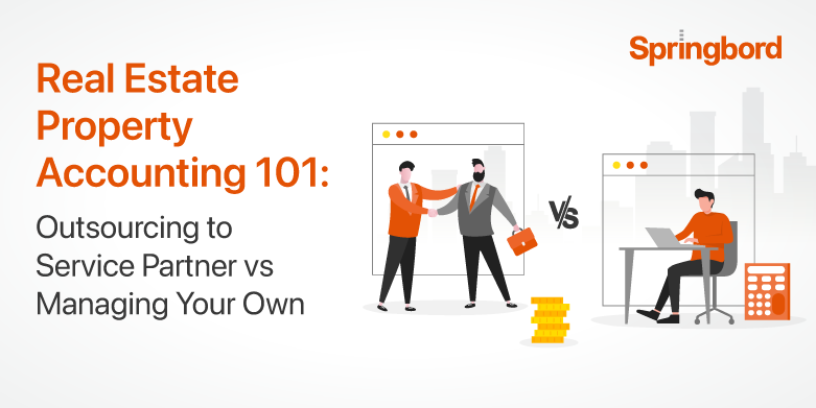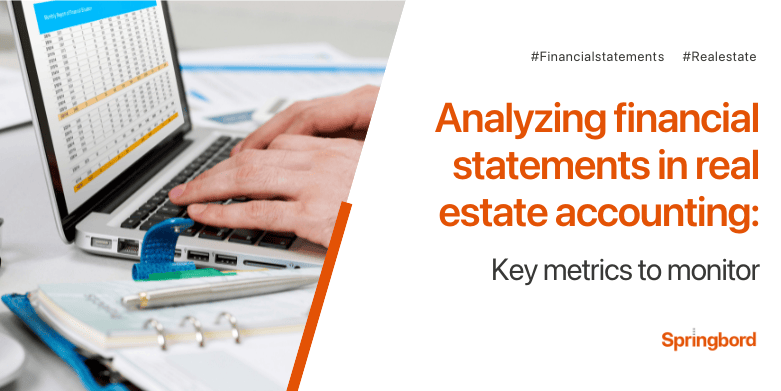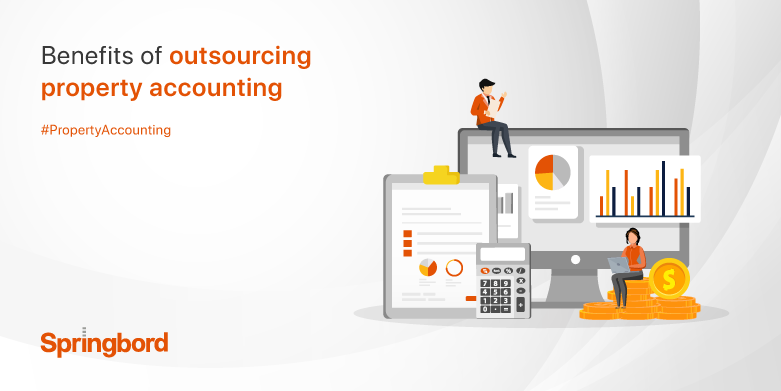 Read time 5 min
Read time 5 minIn the constantly changing real estate industry, the pivotal role of property accounting stands as a critical element for achieving operational excellence and fostering business growth. This specialized branch of accounting extends beyond mere number crunching to encompass a strategic framework essential for informed decision-making and regulatory compliance. As the industry evolves, grappling with the complexities of financial management, lease administration, and compliance becomes increasingly challenging. This blog delves into the intricate world of outsourcing real estate property accounting, exploring the nuanced challenges businesses face and the critical decision between managing accounting processes in-house or outsourcing to a specialized service partner. Through a detailed examination of common struggles and technical nuances, we aim to shed light on the best practices for efficient property accounting, ultimately guiding businesses toward sustainable growth and operational efficiency.
Assessing the Challenges
Common Struggles
Real estate accounting is fraught with complexities that can challenge even the most seasoned professionals. From stringent compliance requirements to multifaceted financial reporting, businesses often find themselves navigating a labyrinth of regulatory obligations. Lease management, a critical aspect of real estate operations, requires careful administration to ensure accuracy and efficiency. The intricacies of managing multiple leases, each with its unique terms and conditions, can significantly burden internal resources.
Moreover, the industry’s competitive nature mandates precise and timely financial reporting. Stakeholders, investors, and regulatory bodies demand transparent and accurate financial disclosures, making robust accounting systems a necessity. These complexities are compounded by the need to adhere to various local, national, and international regulations, further emphasizing the importance of specialized knowledge and expertise in real estate accounting.
Technical Nuances
The technical nuances of real estate accounting add another layer of complexity. CAM (Common Area Maintenance) reconciliations, for example, involve the allocation and reconciliation of property maintenance expenses among tenants—a process that requires detailed record-keeping and financial acumen. Similarly, managing depreciation schedules for real estate assets necessitates a deep understanding of tax laws and accounting principles to accurately reflect the asset’s value and tax implications over time.
Mortgage servicing, another critical element, involves managing the payment processing, accounting, and reporting for property loans. This not only requires meticulous attention to detail but also a thorough understanding of mortgage finance and contractual obligations.
Outsourcing vs. In-House Management
The dilemma between outsourcing real estate property accounting and managing it in-house is a critical decision for businesses aiming for growth and efficiency. This choice not only impacts the financial health of an organization but also its operational agility and strategic focus. In the context of real estate, where the stakes are high and the margins for error slim, this decision becomes even more pivotal. Let’s delve into the pros and cons of both approaches to understand which option might best serve your business needs.
Outsourcing Pros & Cons
- Pros:
- Expertise: Outsourcing partners like Springbord bring specialized knowledge and experience, ensuring compliance and accuracy in financial reporting.
- Cost Savings: Reduces the need for in-house accounting staff and infrastructure, leading to significant cost reductions.
- Scalability: Easily scales services up or down based on business needs, providing flexibility during growth or downsizing phases.
- Cons:
- Less Control: Companies may feel a loss of control over their accounting processes.
- Dependency: There’s a reliance on external parties, which may pose risks if the outsourcing partner faces operational challenges.
In-House Management Pros & Cons
- Pros:
- Control: Full control over accounting processes and immediate access to financial data.
- Integration: Easier integration with internal processes and systems, providing a cohesive operational flow.
- Cons:
- Resource Allocation: Requires significant investment in human and technological resources.
- Required Expertise: Maintaining a team with the necessary expertise can be challenging and expensive.
Decision Factors
Business Size & Complexity
For businesses with a large real estate portfolio or those engaging in complex transactions, outsourcing can offer access to specialized knowledge and technology that may not be feasible to develop in-house. Springbord, with its comprehensive suite of real estate services, is positioned to handle large-scale operations and complex transactions, providing tailored solutions that align with business objectives.
Cost-Benefit Analysis
Conducting a cost-benefit analysis involves evaluating direct costs, such as salaries for in-house staff versus fees for outsourcing services. However, indirect benefits like flexibility, strategic alignment, and the ability to scale operations should also be considered. Outsourcing with a partner like Springbord not only aligns with strategic business objectives but also offers flexibility to adapt to changing market conditions and business needs.
Springbord’s Enhanced Real Estate Services:
Springbord’s real estate services are meticulously designed to address the multifaceted challenges of the industry. Our approach combines technological innovation with deep domain expertise to offer solutions that optimize operations, reduce costs, and enhance decision-making processes. Key aspects include:
- Advanced Lease Management: Beyond lease abstraction, Springbord offers comprehensive lease management solutions, facilitating efficient tracking and management of lease terms, payments, and renewals.
- In-depth Property Analysis: Utilizing cutting-edge data analytics, Springbord provides insights into property performance, market trends, and investment opportunities, empowering clients with actionable intelligence.
- Regulatory Compliance: With an in-depth understanding of the regulatory landscape, Springbord ensures that all accounting and financial reporting adheres to the latest standards and laws.
Customized Solutions Tailored to Real Estate:
Springbord’s capability to deliver customized solutions is rooted in our commitment to understanding the unique challenges and goals of our clients. This bespoke approach is evident in several key offerings:
- Data Management and Analytics: Tailored data solutions that harness the power of advanced analytics to unlock valuable insights from complex real estate data.
- Technology Integration: Leveraging the latest technologies, Springbord integrates innovative solutions with existing systems, enhancing efficiency and productivity.
- Client-Centric Approach: Each solution is crafted with the client’s specific needs at the forefront, ensuring that the services delivered are not just comprehensive but also highly relevant to the unique demands of the real estate sector.
Springbord’s expertise in providing specialized real estate services and customized solutions underscores our position as a strategic partner for businesses looking to navigate the complexities of the real estate market. Through a blend of industry knowledge, technological prowess, and a client-focused approach, Springbord is equipped to address the nuanced needs of the real estate sector, driving growth and operational excellence for our clients.
Conclusion
At Springbord, we understand the pivotal role of real estate property accounting in driving business success. From navigating complex financial management to ensuring regulatory compliance, we recognize the challenges businesses face in balancing operational efficiency with strategic growth. As businesses contemplate whether to outsource this critical function or manage it in-house, we provide tailored solutions that align with their unique needs and objectives.
Outsourcing to a specialized real estate service partner like Springbord, offers access to expertise, cost savings, and scalability, enabling businesses to focus on core operations while ensuring accurate and efficient property accounting. On the other hand, managing accounting processes in-house provides direct control and integration with internal systems, although it requires significant resource allocation and expertise. With our comprehensive suite of real estate services, including advanced lease management and tailored data solutions, we empower businesses to make informed decisions, optimize operations, and drive sustainable growth in the competitive real estate landscape.
Contact us today to see how we can tailor our solutions to meet your specific needs and help your business thrive.







